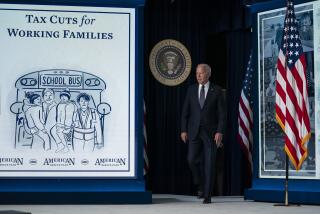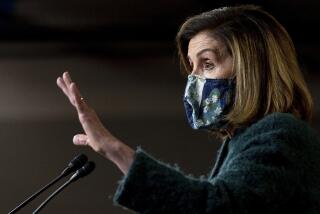Home From the Cold War to Face a Wolf
It won’t work miracles--or solve more critical problems--but Americans will probably get a quick tax credit early next year to spur the economy.
Most likely it will be a variation on the proposal of Rep. Dan Rostenkowski (D-Ill.), chairman of the tax-writing House Ways and Means Committee. He would give each taxpayer a credit of up to $200, based on contributions to Social Security.
The idea is to get extra money to taxpayers by April or May, in reduced tax payments or higher refunds, in hopes of reviving consumer spending. Maybe it will.
More important will be other tax measures considered by Congress, as it grapples with Rostenkowski’s proposal to finance the $200 credit by hiking the tax rate on top incomes--those above $120,000--as well as many other ideas on individual retirement accounts, capital gains and investment tax credits.
Watch those debates because the fate of those tax ideas will indicate what kind of country America wants to be in the years and decades ahead.
The time for the decision is now. “Next year the American people will come to grips with the fact that they’ve won the Cold War, but paid a price,” says Sen. Bill Bradley (D-N.J.), an authority on taxes.
“If the school doesn’t have enough money, and the highway is potholed, there’s a reason for that,” Bradley says. Trillions of dollars have been spent over four decades for the defense of the West. Now there’s business pending here at home.
Like most Americans, Bradley has a list of suggestions--beginning with infrastructure. Postponed maintenance has left America’s bridges crumbling and its water systems endangered. Inadequate local transportation often prevents people getting to jobs and compounds problems of unemployment and welfare. Repair bills are overdue.
And there is a new kind of infrastructure, telecommunications networks and national data highways, that America must build if its economy is to be as advanced as those of Japan and Europe. Bradley would have pension investment finance some of that development.
He would also impose a tax on gasoline to pay for infrastructure, an idea favored by others as well.
Bradley’s most original idea is on education for the young and middle-aged. Recognizing that U.S. employees need the kind of retraining that is routine in the Japanese and German industrial systems, and that everybody will need to change jobs and careers in the new economic environment, Bradley--a Princeton graduate and Rhodes scholar--would have the government lend up to $33,000 for college tuition. Recipients would repay the loan from subsequent earnings, which would be as much 60% higher as a result of education.
The real payoff would be in enabling Americans to adapt confidently to the changing world. Like many others, the 48-year-old senator sees enormous change ahead, with 3 billion people coming from underdeveloped or totalitarian societies into the world economy. “They will want to import and to export,” he says, which will mean opportunity for companies and countries with higher skills but a threat to those with low-skilled work forces.
The message is that America must find the resources and the will to train its people and finance their passage to a new economic environment. It’s really unwise, economically and politically, to consign employees in fading industries to idleness and despair. Such neglect wastes human capital, undermines community and feeds the politics of resentment--which are having a field day right now. Presidential hopefuls in both parties talk of isolationism and blame foreigners for America’s troubles.
But withdrawal rather than commitment is a miserable policy. Americans would miss opportunity, and we would still have to face the fact that we lack the savings to finance our society.
The Washington-based American Council for Capital Formation has frightening statistics, showing that U.S. personal saving has declined by more than half in the last decade while the federal government deficit has trebled. The national savings rate has gone from 7% of the economy’s output to barely 1% today. And U.S. investment has fallen to less than 1% of national output. No wonder Americans sense that the place is crumbling; if you do not sow, you cannot reap.
Tax policy can go far toward fixing that. You’ll hear proposals for expanded IRAs to spur personal saving. And business groups, even some in Texas, say a gasoline tax wouldn’t be a bad idea if the money went to reduce the federal deficit. Basically, the desire is for America to return to being like a household with money in the bank rather than a wolf at the door.
How important is it that we do that? Reflect on our ally Britain, less than a century ago the unrivaled political, military and economic leader of the world.
A victor in two wars this century, Britain let its standard of living stagnate while that of others rose. Last week, the 12-nation European Community voted to proceed with a unity frankly centered on Germany, and barely tolerated the concerns of Britain, whose people now live poorer than other Europeans and whose workers are among Europe’s lowest paid.
As Americans welcome a few bucks in tax cuts next year, they might think about saving an extra dollar or two as well.
More to Read
Get the L.A. Times Politics newsletter
Deeply reported insights into legislation, politics and policy from Sacramento, Washington and beyond. In your inbox three times per week.
You may occasionally receive promotional content from the Los Angeles Times.










